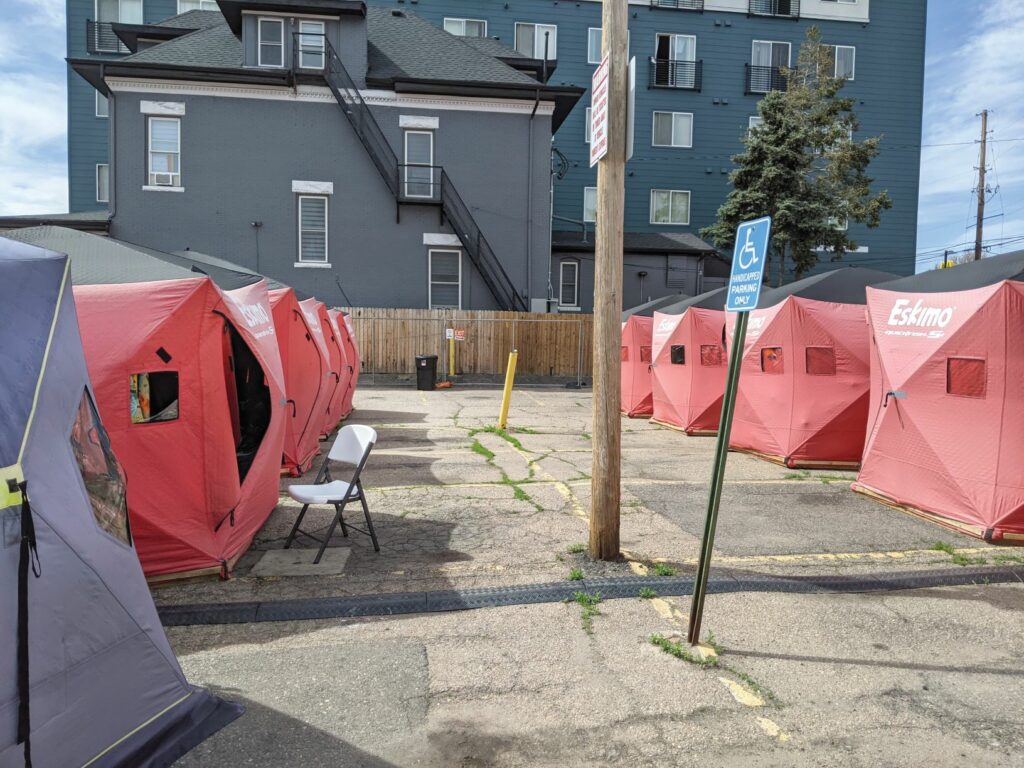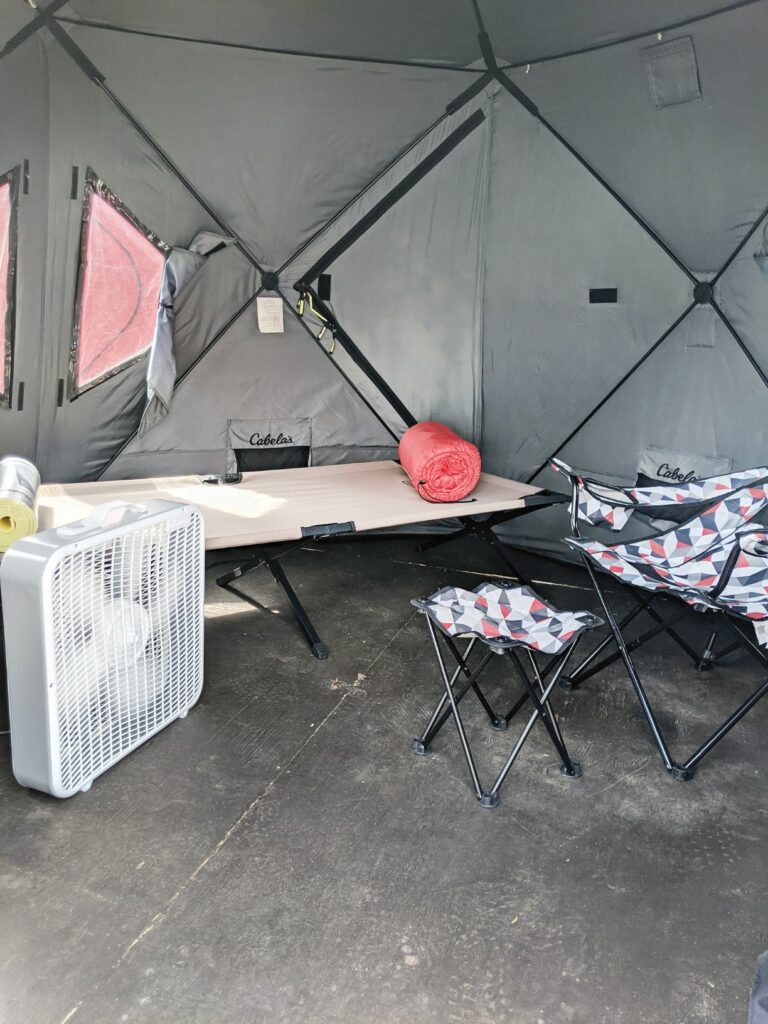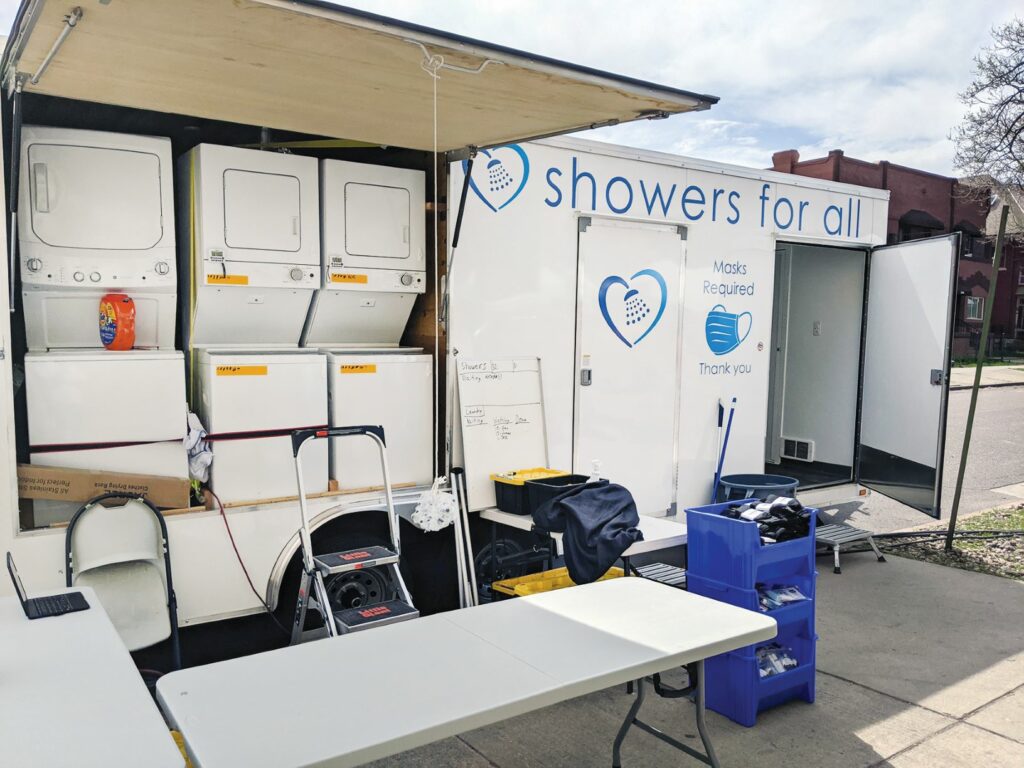
For Regis University, providing emergency housing for people experiencing homelessness is part of their mission as Jesuit Catholics and a service they can provide as a major landowner in North Denver.
“Ours is a faith that does justice, a faith that calls on us to commit ourselves to combat indifference, walk with the poor and foster dignity among all peoples,” said Regis President the Rev. John P. Fitzgibbons, S.J. “We were given the opportunity to provide a safe and secure temporary home for those suddenly cast onto the streets through no fault of their own. We embrace and welcome those who need an extra measure of human kindness and concern during these difficult times. As Pope Francis says, ‘If we do not take care of one another … we cannot heal the world.’”
The university is working with the Colorado Village Collaborative (CVC), which has been hosting a similar project in the Capitol Hill neighborhood for 5 months and is currently working on another in Park Hill. CVC provides the temporary structures, The Saint Francis Center will provide staffing for the Regis site and together they work with service providers to help their residents access medical care, job placement, and more permanent housing. The site will be in one of Regis’ parking lots on campus but away from both students and neighbors, creating privacy for residents, the university students and staff, and the community.
University officials said most of the North Denver community has been supportive. “The neighbors aren’t surprised to see a jesuit catholic college stepping up in this way,” explained Jenna Farley. Farley is the Director of Community Relations for Regis, but also a 5th generation North Denverite and nearby homeowner herself, which she felt was important for the community to know. She told The Denver North Star that the biggest question she’s received is about safety. Some community members envisioned spanning tarps, poor hygiene, and drug labs, but the site has new, clean temporary structures and sanitary facilities, and drugs are not allowed. Staff is on site at all times and the campus has their own security as well. Farley said once the details were explained, nearly everyone they’ve spoken with has been supportive of the University’s decision. “We’re honoring the humanity of neighbors forced to live on the street.”

Cole Chandler, executive director of CVC, said when they were planning the Cap Hill location there was an illegal encampment across the street composed of tarps, tents, and no sanitary facilities, which made residents assume the sanctioned ones were the same, causing strong, understandable concerns. In reality, the unsanctioned site disbanded and the city approved site has been a welcomed addition by permanent residents. In the five months they’ve been operating, they haven’t received a single complaint from residents in the homes and apartments that surround the site on three sides (the fourth side is a church hosting the SOS).
Jason Hornyak, head of the Chaffee Park Neighborhood Association nearby the Regis site, sent a statement of support for the new Regis site. “The Chaffee Park Neighborhood Association wholeheartedly supports the Safe Outdoor Space project at Regis University – who we applaud and appreciate for hosting. This model has a proven history in other parts of the city, and we are excited that our community will play a role in adding to their positive legacy. We look forward to the opportunity to help our neighbors who are in need of emergency housing by welcoming them to our community and volunteering with the Colorado Village Collaborative. The housing crisis is a societal issue, which means we all have a role to play in fixing it.”
Councilwoman Amanda P. Sandoval, who represents the area, sent her own statement of support. “I sponsored an amendment to the Denver Zoning Code in the fall of 2020 to allow Safe Outdoor Spaces in Chapter 59 zone districts, Regis University has Chapter 59 zoning and has the opportunity to step into this important space. I’m proud of their leadership and our partnership.”
This mostly positive response had been different than Park Hill, which has faced greater opposition to a site. A small group of residents are currently suing a church working with CVC to provide a similar space, attempting to stop the project. The head of the Registered Neighborhood Association in Park Hill released a statement in support of the site and does not support the lawsuit.
Chandler said in the 24 hours following the announcement of the lawsuit, CVC raised over $25,000 online, which he sees as strong evidence of community support for their work.
The Safe Outdoor Space (SOS) sites are a newer initiative allowed by the city on private property, and are one of the tools being used to address a rise in homelessness. While not intended to be long term solutions (the Regis site is expected to last 6 months), they provide safe, legal housing alternatives to the tent communities that have popped up in areas like Civic Center Park and elsewhere.

Ian Stitt, SOS Manager with The Saint Francis Center, will be overseeing the Regis site and in the meantime is at the Cap Hill location. He said finding more permanent housing is often a two year process and he’s glad to see the city taking an all of the above approach. “There’s no one solution to homelessness,” he noted. Stitt explained some residents leave during the day for work or to find work while others meet with city services on site. While everyone’s needs are different, he believes these sites offer transitional opportunities.
Regis University is holding several public meetings to address any community questions. While two were prior to The Denver North Star’s publication date, there is one additional virtual meeting on May 20th. Access information is available at www.coloradovillagecollaborative.org/safe-outdoor-space.
University officials said they welcome more community feedback individually as well.
Byron Plumley was a faculty member at Regis for 25 years and a founder of the Peace and Justice Studies Department. He’s been volunteering at the Cap Hill location and will be shifting to Regis when they open. He also lives near Regis. To Plumley, the question for the community is “am I willing to share my neighborhood with someone who is struggling?” He is, and he hopes the rest of North Denver is too.
The SOS sites are funded in large part by the City and County of Denver, but also private donations. You can learn more about CVC’s projects at https://www.coloradovillagecollaborative.org/safe-outdoor-space or by calling (720) 432-8285.
The city has also announced several other proposals aimed at helping Denver’s rise in homelessness. Earlier this month Congresswoman Diana DeGette and Mayor Michael Hancock announced a plan to use federal funds to purchase a motel in Northeast Denver to provide supportive housing for approximately 150 people. Several other older motels have been converted on a temporary or more permanent basis as well, including one in North Denver.

Be the first to comment